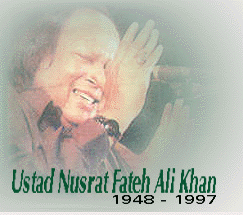
--Vishal Bhatia
 |
Dear fellow lovers
of ustaad nusrat fateh ali khan..in case you don't know yet,the mastAero
is no more.. our heart grieves for him but we ought to realize that people
like him never really die,the master still lives through his music.. Great
people never die,they simply fade away into the oblivion leaving us their
cherished memories..so au revoir may his fans meet him in heaven...
--Vishal Bhatia |
Qawwali
is popularly associated with NORTHERN INDIA and Pakistan, but it flourishes
all over Southern Asia wherever Muslim communities thrive. While devoutly
ISLAMIC and originally specifically SUFI in nature, it is genuinely popular
with Hindus and Sikhs.Qawwali,"the Islamic version of Hindu bhajan," as
music
director Naushad Ali once described it-or the "Kriti",the devotional song
of the south-shares
points
of reference with other semi or light classical music forms found in subcontinent.Qawwali
means 'utterance' in persian from Qaul meaning 'to tell'.Like other Indian
musical forms it draws on the power of improvisation and relies on the
skill of Qawwal to interpret its words and rythmic structure in such a
way as both to kindle the emotional religious fire of the lyrics and also
to brand the performance with
originality.Qawwali's
origins throw up many patently embellished and frustratingly contradictory
accounts but Qawwali definitely originated with the Chishtiya silsilah
or mystic order of
SUFIS--SUFISM
being a branch of mystical Islam--the tenets of whose Chishti masters were
written down by 12to century.Others claim Qawwali's specific creator to
be Amir Khusrau--even in his lifetime affectionately nick named Tutiye-Hind(
the Parrot of India )--to whom so much in Indian music is attributed.
The ocean
of Sufism
Sufis
believe that they are following the same path as the original seekers of
truth who have existed from the beginning of mankind. The word sufi comes
from the Persian word saaff, meaning pure. There are various schools of
thought that can be traced back to different gurus who in turn can be traced
back to the
prophet
Mohammed. Whilst Sufis may use the religion of Islam as a discipline, they
are not bound by any religion. They say it is equally acceptable to pray
in a Christian church or meditate with Buddhists, wherever truth lies Sufis
will seek it. They have had several rifts with the leaders of Islam over
the centuries and rejected the militarisation of Islam on the grounds that
it was opposed by the philosophy of the Koran.The Persian founders of Sufism
were from the regions that bordered the silk route and consequentlythey
were subject to influences as diverse as the philosophies of Plato and
Socrates, Buddhist, Christian and Hindu teachings, and the native religion
of Zoroastrianism. The teachings are handed from leader (sheikh) to pupil
in the form of poetry, stories and music. The content of these stories
varies from the profound to the pornographic, and the wisdom contained
within them is for the listener to work out
for
himself. One of the great writers of Sufi texts was Farid Ud-Din Attar,
an apothecary, born in the 12th century in north-east Iran, who travelled
to Egypt, Damascus, Mecca, Turkestan and India in search of knowledge.
He was tried for heresy - a regular feature in the history of Sufis - and
banished. His most famous writing is 'The Conference Of The Birds', an
epic poem that describes the way of the Sufi through a series of stories
about birds on a quest for a king, who eventually discover that those who
have made it through the trials of the journey have become the very thing
they seek.
The tenuous link between Indians
and Pakistanis is best exemplified by the thunderous response Nusrat has
recieved in India.Nusrat's music has done much more in bringing people
together than 50 yrs. of political wranglings.His music, steeped in old
Indian cultural tradition has come like a whiff of fresh air in a stale
arena bringing young people addicted to western culture back to the masters
fold.It is distressing that a person who has done so much should be denied
permission to perform in India due to personal prejudices and political
ambitions of shallow, narrow- minded political leaders.Bal Thackeray,the
chief of Shiv Sena, by trying to muzzle Nusrat and gain political mileage
to appease Hindus is making a big mistake.Nusrat's music has transcended
political,cultural and religious boundaries and Bal Thackeray should be
publicly censured for trying to deny Indians the spiritual upliftment and
a deep sense of inner peace which the maestro has provided them. It is
disheartening to find that Nusrat has started composing music for the movies
like Aur Pyar Ho Gaya.Not only is the music stale
but the voice also is definitely
not vintage Nusrat.By churning out such substandard stuff he is being unfair
neither to his fans nor himself but to his art which has brought him worldwide
acclaim, popularity and monetary success.You are most welcome to send your
views and criticism regarding Nusrat to me.
MP3 files section
Mp3 files are the audio files.These have quality that is better than CD quality.They are played using MP3 player called winamp.These files are 4-5 mb in size.The MP3 files presented here are for trial purposes only and must be deleted 24 hours after the download.All the files are stereo,16 bit,bit rate of 128Kbs,sampling rate of 44Khz.
To listen to these great MP3 files,download
the MP3 player WINAMP free from: http://winamp.lh.net/main.html
|
Ustad Nusrat Fateh Ali Khan These songs are from the Album "Sangam".It is written by Jawed Akhtar.It was the first joint venture of Nusrat sahib with an Indian artist |

Picture gallery of Indo-pak partition in 1947
You are visitor number: |
This site is from The TruthLine Visit The TruthLine to have an insight into the various burning issues of India like Terrorism in the states of Punjab and Kashmir,the political scams,the corrupt politicians. |
Can we erase the boundaries between India and Pakistan. Join the discussion forum |